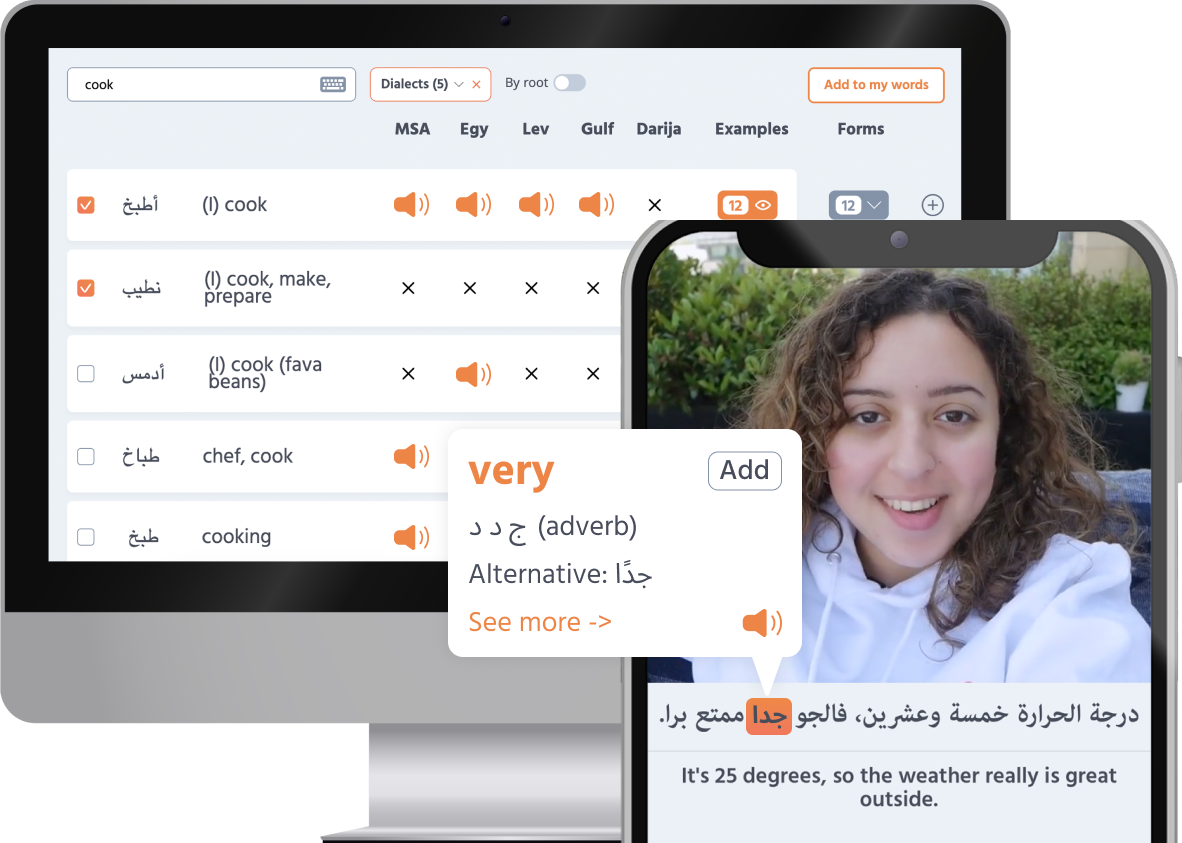Maghrebi Arabic (Darijas)
Playaling is going to make mastering Maghrebi Arabic both easy and enjoyable. With our real-world videos spoken by natives, you will master Maghrebi Arabic in no time!
Welcome to Playaling, your destination for mastering Darijas! Our platform is crafted to celebrate the rich tapestry of the Arabic language and its myriad dialects. Engaging with Darijas opens new avenues for meaningful communication and a profound connection with the rich culture of North Africa. At Playaling, we invite you to embark on an enchanting exploration of the Arabic language, with a special emphasis on the beauties of Darijas.
Maghrebi dialects, often referred to as Darija, are spoken throughout the countries of North Africa from Mauritania to Libya. Classified within the Maghrebi linguistic group of North African countries, Darija is the primary means of communication for the majority of people living in the Maghreb region of North Africa. In some regions, particularly where Amazigh languages and Hassaniya dialect are spoken, it is used as a second language.
The majority of Maghrebi content currently on Playaling is in Moroccan Darija, although we are currently expanding the range of videos in Tunisian Derja, also known as Tounsi. There are select videos in Algerian, Libyan, and Hassaniya (spoken in Mauritania) as well.
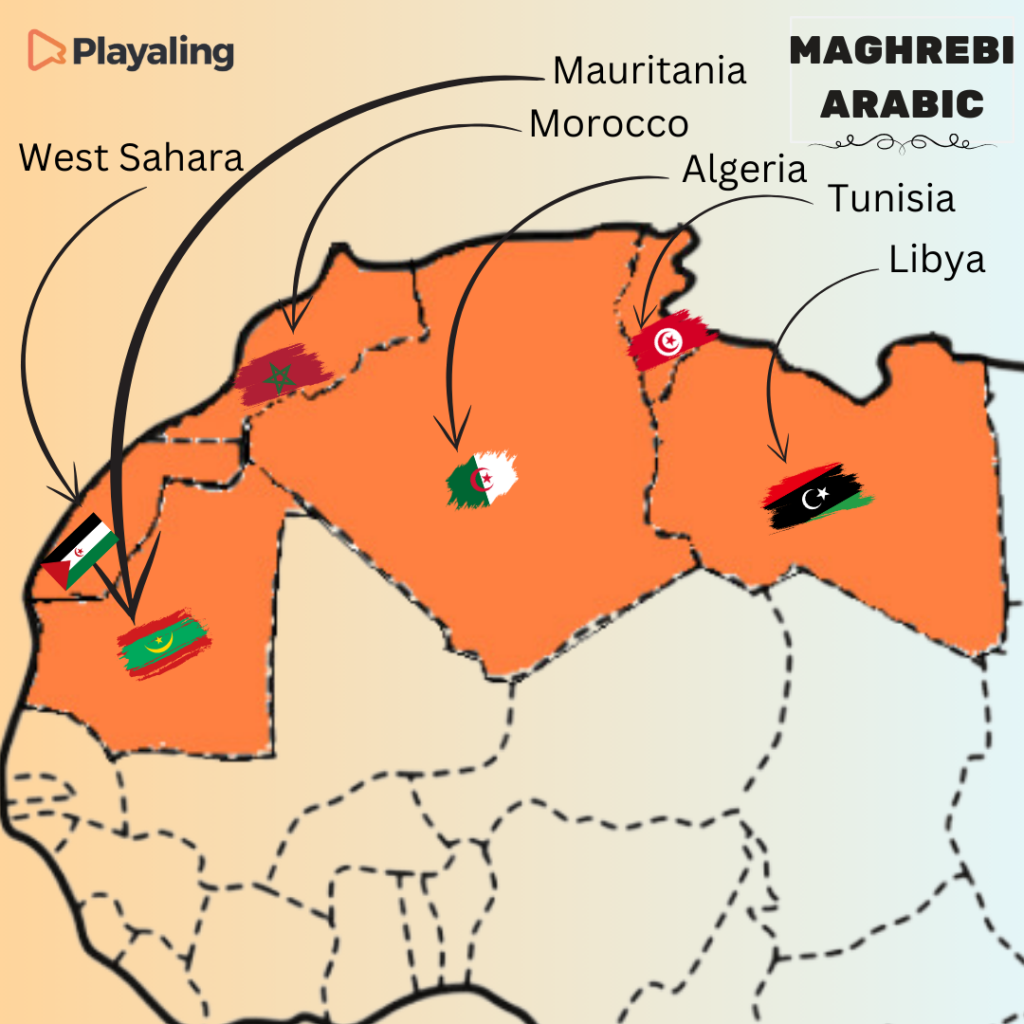
Darija encompasses a range of Arabic dialects spoken in the countries of the Maghreb region. These dialects include Moroccan, Algerian, Tunisian, and Libyan Darija. Some of these dialects share similarities based on the geographical distribution of their speakers.
These dialects incorporate words from European languages, particularly French and Spanish, due to French and Spanish colonization in Algeria, Tunisia, and Morocco. In Libya, due to Italian colonization there, some Italian words are also present. Borrowed words in English are increasingly used as well. These dialects are also influenced by Amazigh, a group of languages spoken by the indigenous Amazigh people (also known as “Berber,” although this term is increasingly critiqued for its racist etymology) of North Africa, who have roots stretching back millennia, predating the Arab and Islamic conquests of the 7th century.
Explore the richness and diversity of Maghrebi Arabic dialects on Playaling. Discover the influence of historical and cultural factors, as well as the unique linguistic features that make each dialect a fascinating aspect of the Arabic language.
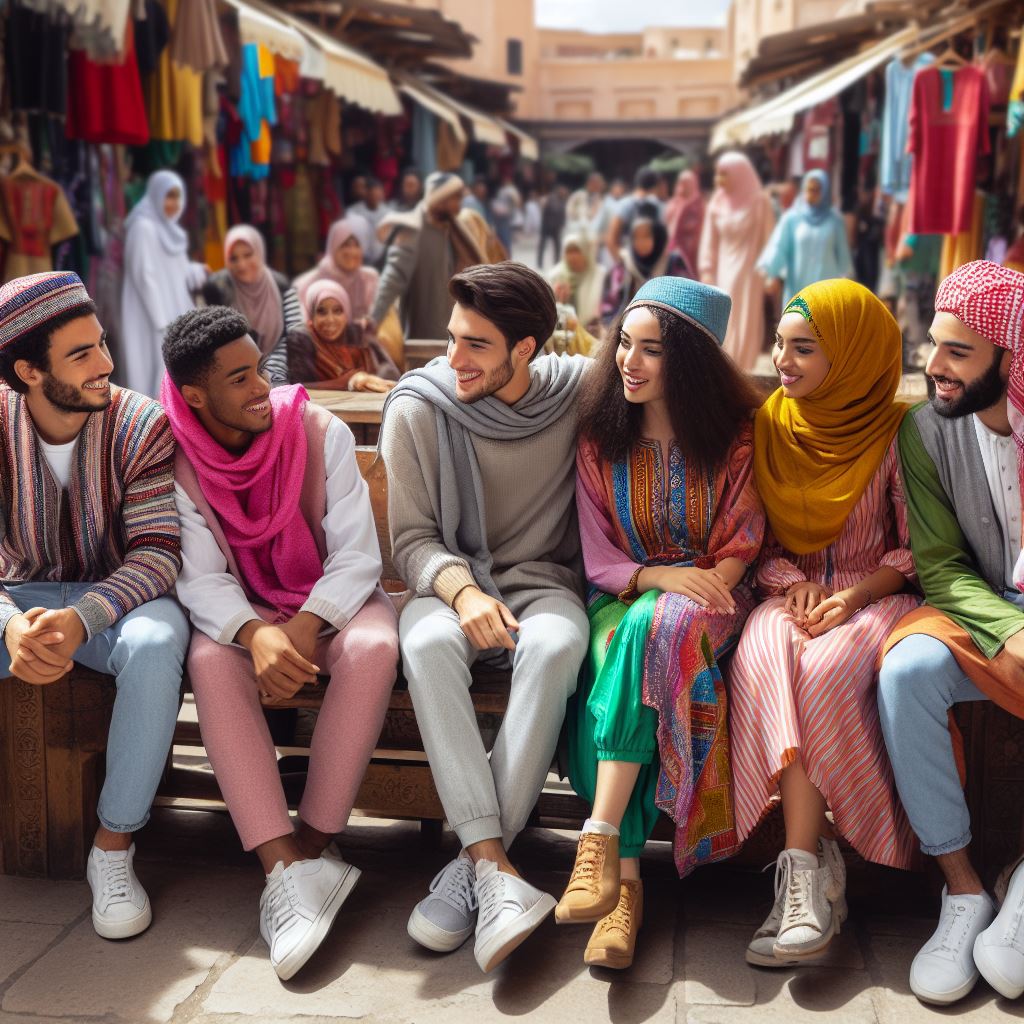
How to learn Darija?
Trying to learn Darija may differ from learning other Arabic dialects, but this does not inherently make it more difficult. The presence of many words from French, Italian, and Spanish within these dialects could make them more accessible for speakers of these languages. Even for those unfamiliar with these languages, persistence and consistent effort are key to mastery. Here are steps to learn the Darija:
Learn the Arabic alphabet and pronunciation first
Familiarizing yourself with the Arabic alphabet provides a strong foundation for learning any variety of Arabic. Without knowing the alphabet, it’s quite hard to even start learning Arabic. Moreover, not being familiar with the Arabic alphabet means missing out on the beautiful world that Maghrebi Arabic opens up
Understand pronunciation in the Darija
Learn how to pronounce letters in the specific dialect you’re aiming for, as pronunciation varies across dialects. Use resources like Playaling’s Audio Dictionary, which offers the correct pronunciation of words in your target variety of Arabic, thereby facilitating deep understanding.
Learn everyday phrases by watching Playaling’s videos
Concentrate on acquiring phrases that are integral to daily communication, including greetings, polite expressions, and typical conversational phrases. Use real-world videos to listen to these phrases in their natural context, enhancing your understanding and ability to use them effectively.

Explore cultural and artistic content
Dive into the rich tapestry of Maghrebi dialect and culture by engaging with its music, movies, and TV series presented in the dialect. This exposure not only aids in getting accustomed to the dialect’s pronunciation but also deepens your appreciation of its cultural subtleties:
- A song about migration to Europe | إيهاب أمير – بغيت نطير ياما
- Ya Rayah | يا الرايح
- ‘Colonization is great!’ (Note: This title is used in an ironic context within educational content)
- Practice introductions and family members with the Rachid Show
Repeat and review
Repetition and review are fundamental to the Darija learning process. The act of consolidating learned information represents one of the most challenging yet crucial steps toward achieving proficiency in any language or dialect. It’s a common experience to learn something only to forget it later, highlighting the importance of reinforcing acquired knowledge through consistent review and practice. Playaling offers this through interactive texts accompanying the videos on our platform. Additionally, you can further solidify your learning through comprehension exercises included in some videos, ensuring a robust and successful educational journey.
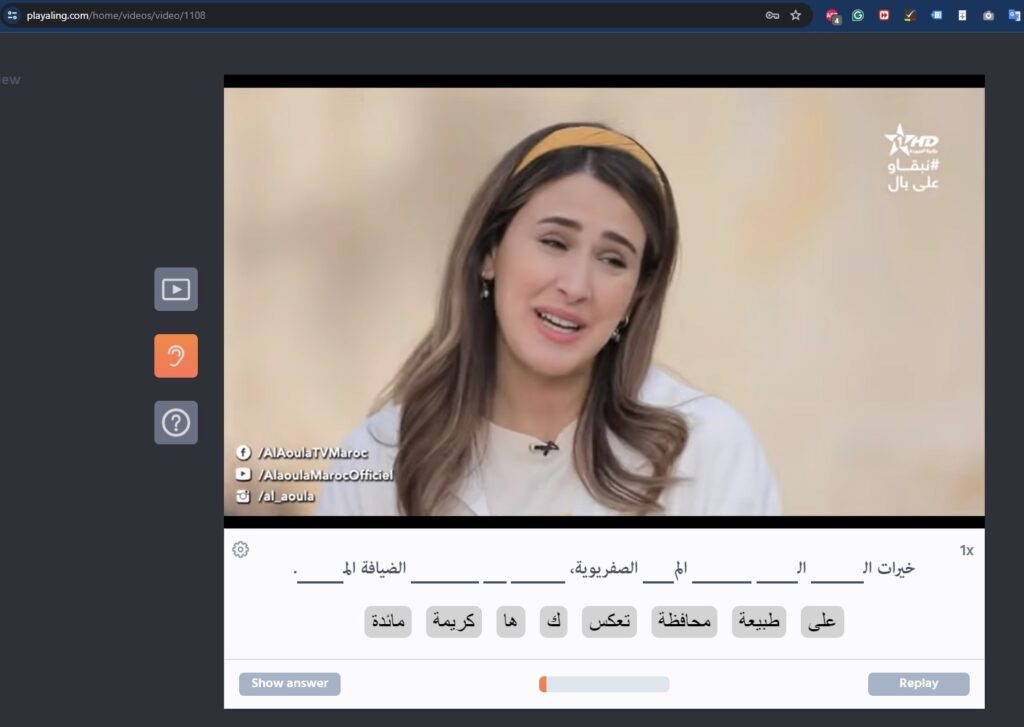
Speak and repeat the Maghrebi words and phrases you learned
Language acquisition is significantly enhanced when it moves beyond silent study. Vocalizing your learning by speaking out loud is essential. You can do this by speaking out loud and engaging in conversations with native speakers of the targeted dialect. This method of practicing not only solidifies what you have learned but also greatly improves your pronunciation and overall language skills. Active verbal practice is a key component in effectively developing your ability to communicate in the new dialect
Persevere and practice daily
Ensure you practice daily and embrace the journey of learning Darija on Playaling. Language learning is a process that requires time, effort, and dedication. Maintain persistence, enjoy each step of your journey, and take time to celebrate your milestones and progress. Consistent practice is the cornerstone of language acquisition, leading to significant improvements and a deeper understanding of the dialect.
Why learn Darija with Playaling?
The most effective way to learn Maghrebi Arabic dialects is by listening to the speech and conversations in these dialects, understanding their meanings, learning how to pronounce them, and repeating them. This is exactly what Playaling provides. It emphasizes the importance of auditory learning, acquiring correct pronunciation, and reinforcing it through exercises and games. So, everything you need and more to learn Darija can be found on Playaling, and this is achieved through:
- Real-world videos in Darija
- Audio Dictionary – learn both the meaning and pronunciation of Darija words, as well as how to use them in context
- Downloadable PDFs – download the transcriptions and translations for any Darija video
- Cloze Listen activity – train your ear by selecting from a word bank or typing what you hear
- Check Comprehension activity – test your understanding of Darija whenever you can!
The difference between the standard MSA and Maghrebi Arabic (Darija)
Darija and Modern Standard Arabic differ in several aspects, and here are some key differences between them:
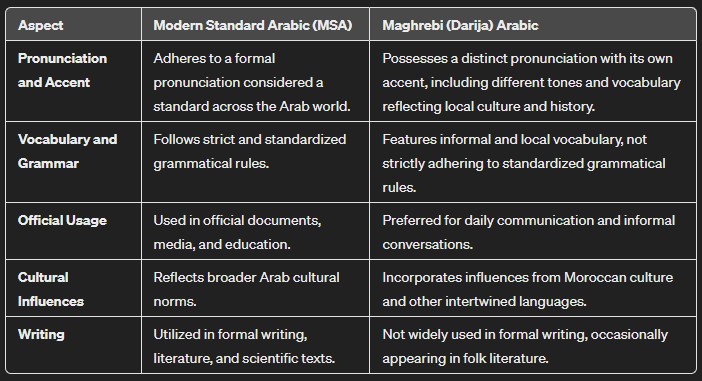
Pronunciation and accent
- Modern Standard Arabic: Adheres to a formal pronunciation considered a standard across the Arab world.
- Darija: Possesses distinct pronunciation with various accents, including different tones and vocabulary reflecting local cultures, histories, and linguistic influences.
Vocabulary and grammar
- Modern Standard Arabic: Follows strict and standardized grammatical rules.
- Darija: Follows unique and local grammar structures that sometimes reflect and sometimes deviate from MSA, and are occasionally more fluid in terms of aspects like gender. It also features informal and local vocabulary.
Official usage
- Modern Standard Arabic: Used in official documents, media, and education.
- Darija: Preferred for daily communication and informal conversations.
Cultural influences
- Modern Standard Arabic: Reflects broader Arab cultural norms.
- Darija: Incorporates influences from local cultures and other intertwined languages.
Writing
- Modern Standard Arabic: Utilized in formal writing, literature, and scientific texts.
- Darija: Not widely used in formal writing, though occasionally appearing in folk literature and increasingly in new literary movements written in dialect.
These differences highlight the linguistic and cultural diversity between Modern Standard Arabic and Darija, illustrating their different roles in society.
The differences among Maghrebi dialects
There is a clear variation between Arabic dialects in Morocco, Algeria, Tunisia, and Libya, including pronunciation, vocabulary, and sentence structure. Here are some key differences:
- Pronunciation of the letter qāf (ق)
which has no equivalent pronunciation in English (MLE c in cut):
– Pronounced like c in cap: in some regions of Algeria
– Pronounced like g in egg: in most of Libya
– Pronounced as the original qāf (ق) as in most Maghrebi dialects (Algeria, Morocco, Tunisia) - Pronunciation of the (ق) is also highly politicized in certain areas, where it has been portrayed as less “educated”.
- ṣād (ص ) which has no equivalent in pronunciation in English (emphatic s), and ḍād (ض) which has no equivalent in pronunciation in English (emphatic d): The letters ṣād (ص ) and ḍād (ض) pronounced as they are.
- ẓā (ظ ) : The letter ظ is often pronounced as ḍād ض , rarely pronounced with its original sound which has no equivalent in pronunciation in English (emphatic th in the).
- Jeem (ج) : Pronunciation sometimes varies and is pronounced as a za.
Maghrebi Arabic vocabulary: Each country has its specific vocabulary, which may differ in some cases, even between towns or cities within the same region.
The chart below displays basic sentences in Maghrebi Arabic dialects, with distinct versions for addressing males and females. Each row presents the masculine version on top and the feminine version underneath. If only one version is provided, it applies to both males and females.
| English | I love you | What time is it? | Where are you from? | What’s your name? | How are you? |
| MSA | َأُحِبُّك أُحِبُّكِ | كَمْ السَّاعَة | مِنْ أيْنَ أنتَ؟ مِنْ أيْنَ أنتِ؟ | ما اسْمُكَ؟ ما اسمُكِ؟ | كَيْفَ حَاْلُكَ؟ كَيْفَ حَالُكِ؟ |
| Moroccan | نْبْغِيْكْ | اشْحَال السَّاعَة؟ | منين نتا؟ منين نتي؟ | آشْ سْمِيْتَكْ؟ | لَا بَاس؟ |
| Algerian | نِشْتِيْكْ | شْحَال رَاهِي السَّاعة؟ | مِنْ وِين أنْتَ؟ مِنْ وِين انتي؟ | وِسْمكْ؟ | وش رَاك؟ وش رَاكي؟ |
| Tunisian | نْحِبّك | قَدَّاش الوَقْتْ؟ | مِنْ وِين أنْتَ؟ مِنْ وِين انتي؟ | شِنْوَة اسْمك ؟ | شِنْوَة أَحْوَالكْ؟ |
| Libian | نْحِبّك | قَدَّاشْ السَّاعَة؟ | مِنْ وِين أنْتَ؟ مِنْ وِين انتي؟ | شِنْ اسْمك؟ | شِنْ الجَّوْ؟ |
The spectrum of Maghrebi Arabic dialects is known for its linguistic diversity and rich cultural heritage.
We are here to offer effective tools and specially designed educational courses to make learning this dialect enjoyable and efficient. Whether you are a beginner or have prior experience, our diverse and inspiring resources will help you improve your language skills and enhance your ability to interact better in society.
Immerse yourself in your educational journey with us, where we provide interactive lessons, diverse learning resources, and opportunities to practice. Discover the beauty of the Darija, learn Maghrebi Arabic, and speak it confidently and proficiently.
Join us today for a unique experience in the world of language and learning, and get ready to acquire new linguistic skills that open doors to broader understanding and communication
Table of Contents
Links
Links

